Chariotte
Op deze pagina vind je alle documenten, voordeelbundels en oefenvragen die worden aangeboden door verkoper CharIotte.
- 153
- 0
- 0
Community
- Volgers
- Volgend
11 Ontvangen beoordelingen
153 items
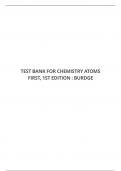
TEST BANK FOR CHEMISTRY ATOMS FIRST, 1ST EDITION : BURDGE
Chapter 1: Chemistry: The Science of Change 1. What is a unifying principle that explains a body of experimental observations? A) Law B) Hypothesis C) Theory D) Phenomena E) Prediction Ans: C Difficulty: Easy 2. What is defined as a tentative explanation for observations that are made that result in the formulation of this concept? A) Law B) Hypothesis C) Theory D) Phenomena E) Prediction Ans: B Difficulty: Easy 3. What is term used for findings that are summarized based on a pattern or ...
- Tentamen (uitwerkingen)
- • 16 pagina's •
Chapter 1: Chemistry: The Science of Change 1. What is a unifying principle that explains a body of experimental observations? A) Law B) Hypothesis C) Theory D) Phenomena E) Prediction Ans: C Difficulty: Easy 2. What is defined as a tentative explanation for observations that are made that result in the formulation of this concept? A) Law B) Hypothesis C) Theory D) Phenomena E) Prediction Ans: B Difficulty: Easy 3. What is term used for findings that are summarized based on a pattern or ...
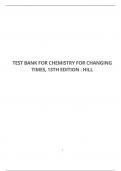
TEST BANK FOR CHEMISTRY FOR CHANGING TIMES, 13TH EDITION : HILL
Chemistry for Changing Times, 13e (Hill) Chapter 1 Chemistry 1.1 Multiple Choice Questions 1) Which science is primarily concerned with the study of matter and the changes it undergoes? A) biology B) chemistry C) geology D) physics Answer: B Diff: 1 Page Ref: Sec. 1.1 LO: 1.1 2) What is natural philosophy? A) a belief in natural foods B) an experimental approach to philosophy C) an experimental approach to the study of nature D) theoretical speculation about nature Answer: D Dif...
- Boek
- Tentamen (uitwerkingen)
- • 32 pagina's •
Chemistry for Changing Times, 13e (Hill) Chapter 1 Chemistry 1.1 Multiple Choice Questions 1) Which science is primarily concerned with the study of matter and the changes it undergoes? A) biology B) chemistry C) geology D) physics Answer: B Diff: 1 Page Ref: Sec. 1.1 LO: 1.1 2) What is natural philosophy? A) a belief in natural foods B) an experimental approach to philosophy C) an experimental approach to the study of nature D) theoretical speculation about nature Answer: D Dif...
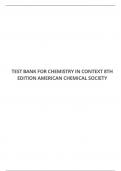
TEST BANK FOR CHEMISTRY IN CONTEXT 8TH EDITION AMERICAN CHEMICAL SOCIETY
Chapter 01 - The Air We Breathe Multiple Choice Questions 1. Of five major gaseous components of air, which is the only one to vary significantly in concentration from place to place and from day to day? A. water vapor B. carbon dioxide C. nitrogen D. argon 2. Which two gases make up more than 95% of an inhaled breath? A. NO2 and N2 B. CO2 and O2 C. O2 and N2 D. N2 and Ar 3. What is the primary component of an exhaled breath? A. N2 B. O2 C. CO2 D. H2O
- Boek
- Tentamen (uitwerkingen)
- • 56 pagina's •
Chapter 01 - The Air We Breathe Multiple Choice Questions 1. Of five major gaseous components of air, which is the only one to vary significantly in concentration from place to place and from day to day? A. water vapor B. carbon dioxide C. nitrogen D. argon 2. Which two gases make up more than 95% of an inhaled breath? A. NO2 and N2 B. CO2 and O2 C. O2 and N2 D. N2 and Ar 3. What is the primary component of an exhaled breath? A. N2 B. O2 C. CO2 D. H2O
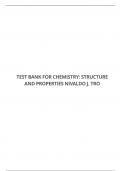
TEST BANK FOR CHEMISTRY: STRUCTURE AND PROPERTIES NIVALDO J. TRO
Chemistry: Structure and Properties (Tro) Chapter 1 Atoms 1.1 Multiple Choice Questions 1) An element has three stable isotopes with masses of 27.977 amu, 28.976 amu, and 29.973 amu. The heavier two isotopes have an abundance of 4.68% and 3.09%, respectively. What is the mass of the element? A) 27.684 amu B) 29.251 amu C) 28.085 amu D) 30.107 amu E) 28.991 amu Answer: C Diff: 5 Var: 1 Page Ref: 1.9 LO: 1.6 2) All of the following will lead to a homogeneous mixture except A) sugar ...
- Boek
- Tentamen (uitwerkingen)
- • 28 pagina's •
Chemistry: Structure and Properties (Tro) Chapter 1 Atoms 1.1 Multiple Choice Questions 1) An element has three stable isotopes with masses of 27.977 amu, 28.976 amu, and 29.973 amu. The heavier two isotopes have an abundance of 4.68% and 3.09%, respectively. What is the mass of the element? A) 27.684 amu B) 29.251 amu C) 28.085 amu D) 30.107 amu E) 28.991 amu Answer: C Diff: 5 Var: 1 Page Ref: 1.9 LO: 1.6 2) All of the following will lead to a homogeneous mixture except A) sugar ...
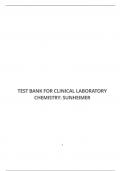
TEST BANK FOR CLINICAL LABORATORY CHEMISTRY: SUNHEIMER
Test Bank Chapter 1 Laboratory Basics 1. Reverse osmosis (RO) is described as a process: A. In which water is forced through a semipermeable membrane that acts as a molecular filter. B. Used to purify liquid chemicals. C. In which water forced through a carbon filter eliminates organic solvents. D. In which salt in water moves through filter paper. 2. Activated carbon filters remove: A. Ions from water. B. Organic compounds from water. C. Acids and bases from water. D. Large particul...
- Boek
- Tentamen (uitwerkingen)
- • 13 pagina's •
Test Bank Chapter 1 Laboratory Basics 1. Reverse osmosis (RO) is described as a process: A. In which water is forced through a semipermeable membrane that acts as a molecular filter. B. Used to purify liquid chemicals. C. In which water forced through a carbon filter eliminates organic solvents. D. In which salt in water moves through filter paper. 2. Activated carbon filters remove: A. Ions from water. B. Organic compounds from water. C. Acids and bases from water. D. Large particul...
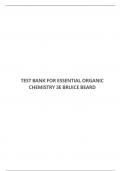
TEST BANK FOR ESSENTIAL ORGANIC CHEMISTRY 3E BRUICE BEARD
Essential Organic Chemistry, 3e (Bruice) Chapter 3 An Introduction to Organic Compounds 1) Which of the following is a tertiary amine? A) B) C) D) E) Answer: E Diff: 1 Section: 3-1 Objective: G2, G3 LO: 3.2
- Tentamen (uitwerkingen)
- • 41 pagina's •
Essential Organic Chemistry, 3e (Bruice) Chapter 3 An Introduction to Organic Compounds 1) Which of the following is a tertiary amine? A) B) C) D) E) Answer: E Diff: 1 Section: 3-1 Objective: G2, G3 LO: 3.2
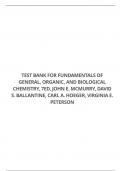
TEST BANK FOR FUNDAMENTALS OF GENERAL, ORGANIC, AND BIOLOGICAL CHEMISTRY, 7ED, JOHN E. MCMURRY, DAVID S. BALLANTINE, CARL A. HOEGER, VIRGINIA E. PETERSON
Fundamentals of General, Organic, and Biological Chemistry, 7e (McMurry) Chapter 1 Matter and Measurements 1) Which of the following is a chemical property? A) melting point B) mass C) flammability D) volume E) temperature Answer: C Diff: 1 Section: 1.1 2) All of the following are examples of matter except A) heat. B) air. C) water. D) salt. E) plants. Answer: A Diff: 1 Section: 1.1 3) Which of the following is a physical property? A) flammability B) conductivity C) abilit...
- Boek
- Tentamen (uitwerkingen)
- • 36 pagina's •
Fundamentals of General, Organic, and Biological Chemistry, 7e (McMurry) Chapter 1 Matter and Measurements 1) Which of the following is a chemical property? A) melting point B) mass C) flammability D) volume E) temperature Answer: C Diff: 1 Section: 1.1 2) All of the following are examples of matter except A) heat. B) air. C) water. D) salt. E) plants. Answer: A Diff: 1 Section: 1.1 3) Which of the following is a physical property? A) flammability B) conductivity C) abilit...
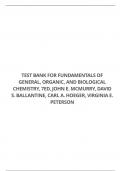
TEST BANK FOR FUNDAMENTALS OF GENERAL, ORGANIC, AND BIOLOGICAL CHEMISTRY, 7ED, JOHN E. MCMURRY, DAVID S. BALLANTINE, CARL A. HOEGER, VIRGINIA E. PETERSON
Fundamentals of General, Organic, and Biological Chemistry, 7e (McMurry) Chapter 1 Matter and Measurements 1) Which of the following is a chemical property? A) melting point B) mass C) flammability D) volume E) temperature Answer: C Diff: 1 Section: 1.1 2) All of the following are examples of matter except A) heat. B) air. C) water. D) salt. E) plants. Answer: A Diff: 1 Section: 1.1 3) Which of the following is a physical property? A) flammability B) conductivity C) abilit...
- Boek
- Tentamen (uitwerkingen)
- • 36 pagina's •
Fundamentals of General, Organic, and Biological Chemistry, 7e (McMurry) Chapter 1 Matter and Measurements 1) Which of the following is a chemical property? A) melting point B) mass C) flammability D) volume E) temperature Answer: C Diff: 1 Section: 1.1 2) All of the following are examples of matter except A) heat. B) air. C) water. D) salt. E) plants. Answer: A Diff: 1 Section: 1.1 3) Which of the following is a physical property? A) flammability B) conductivity C) abilit...
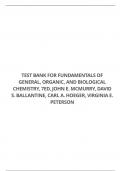
TEST BANK FOR FUNDAMENTALS OF GENERAL, ORGANIC, AND BIOLOGICAL CHEMISTRY, 7ED, JOHN E. MCMURRY, DAVID S. BALLANTINE, CARL A. HOEGER, VIRGINIA E. PETERSON
Fundamentals of General, Organic, and Biological Chemistry, 7e (McMurry) Chapter 1 Matter and Measurements 1) Which of the following is a chemical property? A) melting point B) mass C) flammability D) volume E) temperature Answer: C Diff: 1 Section: 1.1 2) All of the following are examples of matter except A) heat. B) air. C) water. D) salt. E) plants. Answer: A Diff: 1 Section: 1.1 3) Which of the following is a physical property? A) flammability B) conductivity C) abilit...
- Boek
- Tentamen (uitwerkingen)
- • 36 pagina's •
Fundamentals of General, Organic, and Biological Chemistry, 7e (McMurry) Chapter 1 Matter and Measurements 1) Which of the following is a chemical property? A) melting point B) mass C) flammability D) volume E) temperature Answer: C Diff: 1 Section: 1.1 2) All of the following are examples of matter except A) heat. B) air. C) water. D) salt. E) plants. Answer: A Diff: 1 Section: 1.1 3) Which of the following is a physical property? A) flammability B) conductivity C) abilit...
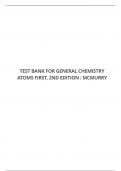
TEST BANK FOR GENERAL CHEMISTRY ATOMS FIRST, 2ND EDITION : MCMURRY
General Chemistry: Atoms First, 2e (McMurry and Fay) Chapter 0 Chemical Tools: Experimentation and Measurement 0.1 Multiple Choice Questions 1) A consistent explanation of known observations is called A) an experiment. B) a hypothesis. C) a prediction. D) a theory. Answer: D Diff: 1 Topic: Section 0.1 Experiment→Hypothesis→Theory: Approaching Chemistry 2) An interpretation of the results of many tests is called A) an experiment. B) a hypothesis. C) a prediction. D) a theory. ...
- Boek
- Tentamen (uitwerkingen)
- • 37 pagina's •
General Chemistry: Atoms First, 2e (McMurry and Fay) Chapter 0 Chemical Tools: Experimentation and Measurement 0.1 Multiple Choice Questions 1) A consistent explanation of known observations is called A) an experiment. B) a hypothesis. C) a prediction. D) a theory. Answer: D Diff: 1 Topic: Section 0.1 Experiment→Hypothesis→Theory: Approaching Chemistry 2) An interpretation of the results of many tests is called A) an experiment. B) a hypothesis. C) a prediction. D) a theory. ...

TEST BANK FOR DIAGNOSTIC MICROBIOLOGY, 4TH EDITION: MAHON
TEST BANK FOR HUMAN ANATOMY & PHYSIOLOGY LABORATORY MANUAL, CAT VERSION, 11 EDITION: ELAINE N. MARIEB
TEST BANK FOR CAMPBELL BIOLOGY CONCEPTS CONNECTIONS 8TH EDITION BY REECE
Not related to the book
TEST BANK FOR RAVEN BIOLOGY OF PLANTS, 8TH EDITION BY RAY F. EVERT
TEST BANK FOR KUBY IMMUNOLOGY, 7TH EDITION: JUDY OWEN